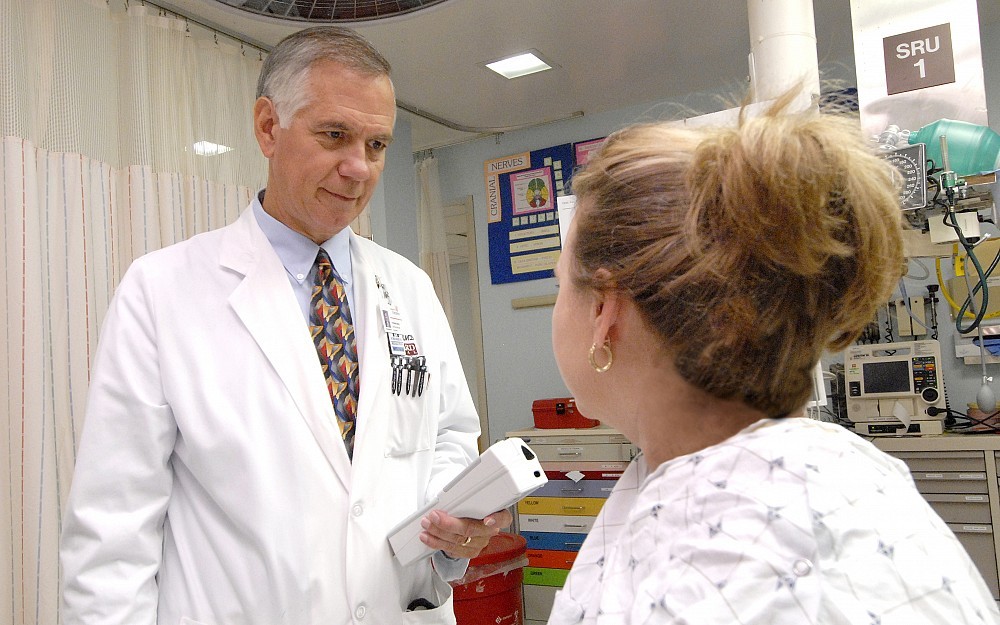
Portable Device May Improve Cardiac Testing, Decrease Hospital Stay
CINCINNATINew devices that bring the laboratory to the patients side in the emergency room could be used to speed the care of cardiac patients and improve their outcomes, say University of Cincinnati (UC) researchers.
Results of this researchled by UCs Richard Ryan, MD, and conducted at four emergency departments across the countryare published in the Aug. 4, 2008, online edition of the Annals of Emergency Medicine.
When patients visit the emergency room with chest pain, physicians typically conduct an ECG (electrocardiogram) and then test the blood for markers that could indicate heart trouble. The American Heart Association (AHA) says the results of this blood test should be available to the doctor in less than 60 minutes. The problem is that hospital laboratories often struggle to get results to the doctor in less than an hour.
UC emergency medicine researchers at Jewish Hospital in Cincinnati tested the effectiveness of doing this initial blood test using a hand-held, point-of-care device. Called i-STAT, and developed by Abbott Point of Care, this device can be used right in the emergency department. The study showed that when using the i-STAT, blood test results were available in under 30 minutes over 80 percent of the time, and under the one-hour limit 98 percent of the time. The hospital laboratory, on the other hand, only met the one hour target about half of the time.
Despite its speed, i-STAT and other similar devices are only as efficient as those using the device and acting on its results.
The emergency department is a staircase, with point-of-care testing being one big step, says Ryan, vice chairman of UCs emergency medicine department. There are ways to get things done and get them done faster. But, he adds, Real efficiencies depend on the many other steps as well.
Christopher Lindsell, PhD, a research assistant professor in UCs emergency medicine department, says that emergency medicine physicians dealing with acute coronary syndromes commonly say time is muscle.
This is not about the brand of device, this is about the physician being able to get the result of the tests faster, and make decisions about how to treat the patient faster, Lindsell adds.
For example, the University Hospital in Cincinnati uses a different type of device to test for cardiac markers. Lindsell says studies there have shown that it can reduce the amount of time a patient spends in the emergency department by an average of 24 minutes.
Theres no doubt that bringing the laboratory to the patients side is faster, says Lindsell, but exactly when a physician decides to order a test, and what happens between the physician getting the results and administering appropriate therapy can drastically change what happens, regardless of the testing device.
Lindsell and Ryan have been studying this whole process. The investigators watch what is going on in the emergency department and the laboratory from the moment a test ordered to when the physician actually gets the results, and they use their observations to work out what other delays there are in the system. Those delaysa difficult blood draw for examplecan then be corrected so that patient care can be as rapid and effective as possible.
Coauthors include W. Brian Gibler, MD, University of Cincinnati; Judd Hollander, MD, University of Pennsylvania; Brian ONeil, MD, and Raymond Jackson, MD, William Beaumont Hospital, Royal Oak, Mich.; Donald Schreiber, MD, Stanford University; and Robert Christenson, PhD, University of Maryland, Baltimore.
The study was sponsored by Abbott Point of Care. Authors report no financial interests with the study sponsor.
Tags
Related Stories
UC study examines delivery timing in mothers with chronic...
December 19, 2024
In a study recently published in the journal O&G Open, University of Cincinnati College of Medicine physician researchers found 39 weeks of gestation is optimal for delivery in mothers with chronic hypertension.
UC receives $3.75M in federal funding for K-12 mental health...
December 18, 2024
A three-year, $3.75 million grant from the Department of Education aims to address critical gaps in the mental health and educational landscape by providing tuition stipends for UC graduate students majoring in school and mental health counseling, school psychology and social work.
Winter can bring increased risk of stroke
December 18, 2024
The University of Cincinnati's Lauren Menzies joined Fox 19's morning show to discuss risk factors for stroke in the winter and stroke signs to look for.
